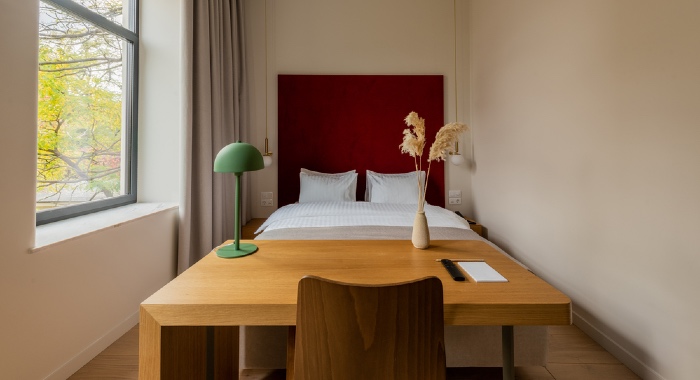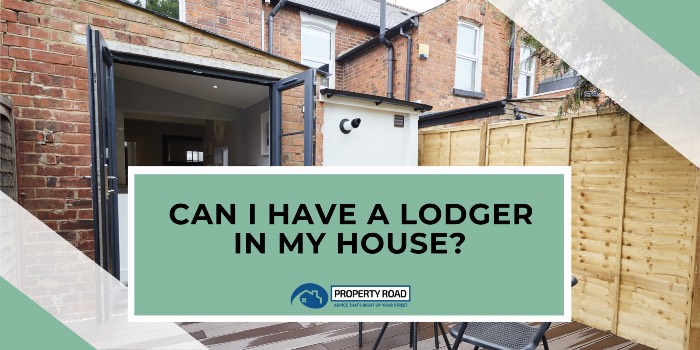The rising cost of living and the increase in rent prices and mortgage interest rates have made it difficult for some people to meet their bills – and they might be asking: ‘Can I have a lodger in my house?’.
For many, taking in a lodger to help cover their bills is becoming increasingly attractive.
However, before considering taking in a lodger, it’s important to understand the legal and financial implications of having a stranger living in your home.
Here, the Property Road team explores the rules and regulations involved, covering everything from insurance and tax implications to safety requirements.
Can I have a lodger in my house?
Yes, you can have a lodger in your house if you are a homeowner or a tenant who has permission from your landlord to sublet. We look at the situation of having a lodger in a council or housing association home below.
Not understanding the rules may lead to serious consequences. You must:
- Check your mortgage contract or tenancy agreement to ensure that it allows you to take in a lodger;
- Inform your insurance provider to ensure your policy won’t be affected;
- Tell HMRC you have a lodger – you can earn up to £7,500 tax-free doing so – see the ‘Rent-a-Room’ scheme below;
- If you are receiving benefits or tax credits, you must inform the relevant authorities about your new living arrangements as it might affect your eligibility.
Finally, you need to ensure that your property meets the safety requirements set by the government, such as gas and fire safety regulations. There are rules to follow when subletting in a rented property and these must be adhered to.
Not following the above advice could mean:
- You might be in breach of your mortgage terms;
- Your tenancy agreement with a private landlord will be breached, and they might serve an eviction notice (usually a section 21 ‘no-fault’ notice);
- The insurer may not pay out on a claim that involved a lodger or tenant they don’t know about.
The bottom line is that you must not think that you have the right to take in a lodger without approval – even if you own your home, some lenders will have an issue if you accept a tenant without permission.
When we bought our second property, the owner actually had a lodger living with her. The property was close to the local University and her lodger was one of the lecturers there.
She had taken on the lodger to help her cover the bills following a divorce. For us, it was quite reassuring to know there was a demand for lodgings in that area. It meant we could buy the property knowing that if we ever ran into financial difficulties, we could always get a lodger in!
Therefore, having a lodger can even make your house more desirable if you decide to sell up. Just make sure you have a watertight legal agreement in place to ensure you can sell the property without infringing on the lodgers rights.
Can I have a lodger in my council house?
Yes, you can have a lodger in your council house – you don’t always need the council’s permission because your occupation will be a ‘secure tenancy’ but it’s always wise to check the tenancy agreement and confirm with the council or housing association first!
For anyone asking, ‘Can I have a lodger in my housing association home?‘ the information also applies to you.
You must:
- Keep the council or housing association informed about your living arrangements if you have a lodger;
- Along with the council housing department, you must inform the housing benefit and council tax benefit departments;
- You will be responsible for the lodger’s action – if they harass neighbours or cause a nuisance you could lose your home;
- If you move out of your council house, the lodger must move out too.
The Rent-a-Room Scheme

The government runs the Rent-a-Room scheme which enables someone to take in a lodger and accept the rent they pay you. Under this scheme, you can:
- Rent out a room that is furnished to a tenant while continuing to live in your home;
- Earn up to £7,500 tax-free per year under this scheme.
The scheme is open to homeowners and tenants who are renting a property – but you must confirm with your landlord that they are happy for you to participate in the scheme.
You will also need to inform HMRC that you have a lodger paying rent.
To qualify for the scheme:
- The room you’re renting out must be in your main residence;
- The room should not be used for business purposes;
- Have a clear rental agreement;
- The tenant must understand what is included in the rent.
If you decide to rent out a room in your home, you will need to understand the different types of tenancies.
- The most common type of tenancy for lodgers is the ‘licence to occupy’. This gives the lodger permission to occupy a room in your home, but does not give them exclusive possession of it. This means that you, as the homeowner, retain the right to enter the room at any time.
- Another type of tenancy is an ‘assured shorthold tenancy’. This type of agreement gives the lodger exclusive possession of the room for a fixed period, usually six or 12 months. However, this type of tenancy can be more complicated and may require you to comply with additional legal requirements, such as having a valid Gas Safety Certificate.
Whichever tenancy you decide to have, it is crucial that you have a comprehensive rental agreement in place. This agreement should outline the rent amount, payment terms, length of stay and any house rules or restrictions.
By understanding the different types of tenancies and having a clear rental agreement in place, you can help ensure a smooth and hassle-free rental experience for both you and your lodger.
If you don’t understand the differences, then you should seek expert legal advice.
For more information about HMRC’s Rent a Room scheme, there is more information on their website.
The non-financial benefits of having a lodger
While we have seen the financial benefits of taking in a lodger, such as having help pay the bills, what are the non-financial benefits?
They include:
- Having someone help with cleaning and grocery shopping;
- A lodger can provide companionship and help alleviate loneliness;
- They might offer new perspectives on life;
- Bring peace of mind, knowing that someone is watching the property when you aren’t there.
How do I get a lodger?
If you have a spare room in your home and are looking to earn some extra income, here’s a guide on how to get a lodger:
Decide if you are ready to become a landlord
Renting out a room in your home means that you will have to share your living space with someone else. You’ll need to be comfortable with that before taking this step.
Advertise your room
There are various channels for advertising your room, including social media, online classifieds and local newspapers. Be sure to include details such as the rent amount, any additional fees, and the length of stay you’re looking for.
Screen potential lodgers
Once you have received inquiries about your room, screen your potential lodgers carefully. Consider running a background check, verifying their employment status and references, and checking their credit score. There are companies that can help with this.
Create a rental agreement
It is important to create a rental agreement that outlines the terms of the tenancy. The agreement should cover everything from payment terms and house rules to notice periods and what is included in the rent. There are template versions available online.
You should also make sure that the agreement doesn’t stop you selling the property if you need to. When we bought a house that had a lodger, our solicitor was very keen to check the terms of the agreement they had to ensure the lodger would leave the property before it legally became ours.
Therefore, this shows the importance of getting a proper legal agreement in place.
Set the rent amount
Research the market to understand what other landlords in your area are charging for similar rooms. You can charge more or less depending on the amenities you’re offering.
Prepare the room
Make sure the room is clean, tidy and equipped with basic necessities such as a bed, wardrobe and desk.
Remember, it’s important to be clear about expectations and responsibilities from the start to ensure a smooth and happy living arrangement for everyone involved.
Can I have a lodger in my house?
Taking on a lodger can be a smart financial decision for those who are looking to earn some extra income, alleviate living expenses, or simply want to keep company.
It’s important to weigh the pros and cons, evaluate your living situation, and research the legal and financial implications thoroughly.
When done correctly, taking on a lodger can be a win-win situation, offering you extra – potentially – tax-free income and the lodger a place to call home.




